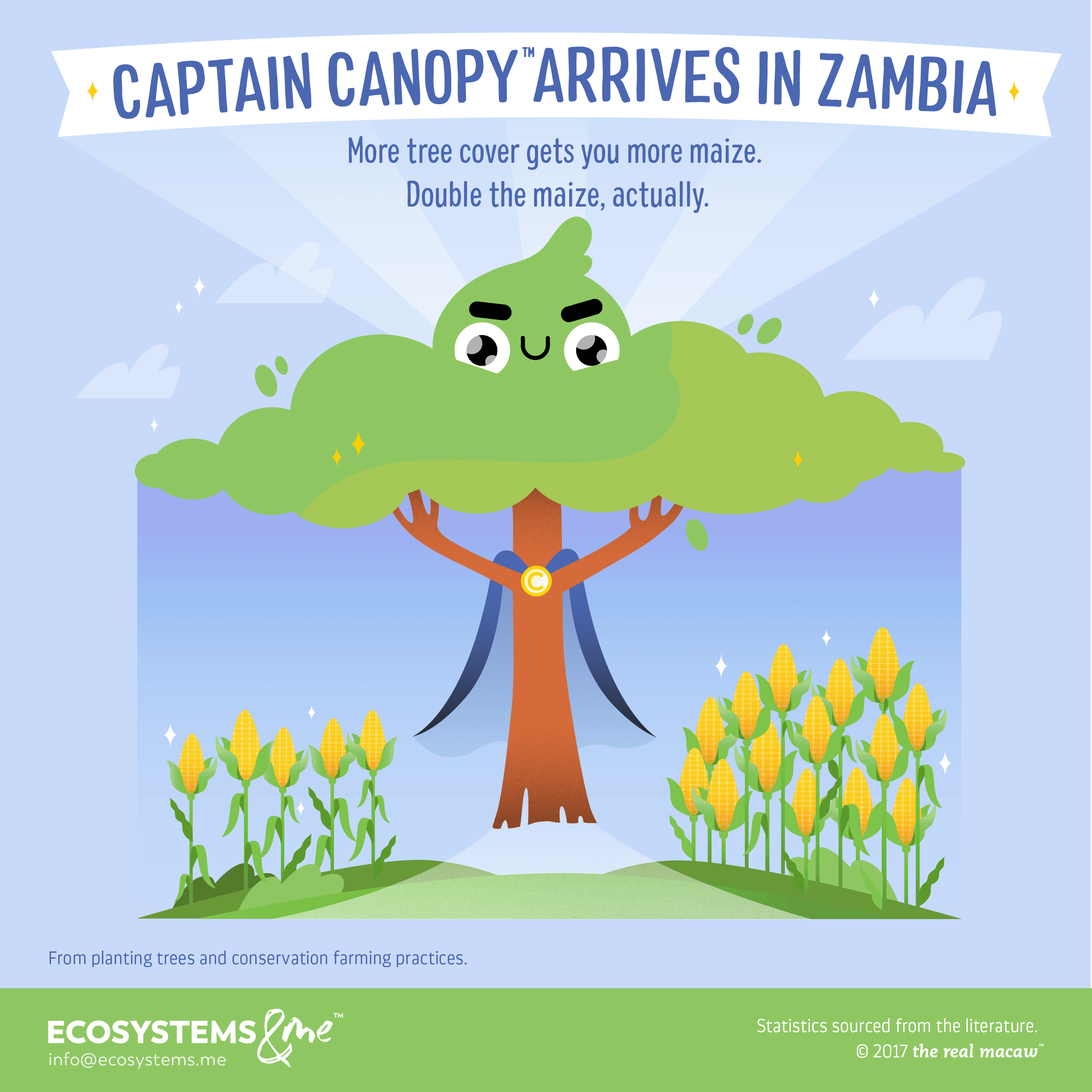
How do you double maize yield? The answer is simple: call Captain Canopy. That is to say, plant some trees.
Meet Captain Canopy
“Hey,” said one maize plant to the other, “can you lend an ear?”
Leaves waving sleepily in the wind, the other plant blinked awake. “What’s up?”
“I can’t find enough nitrogen.” He flailed his sparse leaves for emphasis.
The second plant stared blankly back before curling his top two leaves into a shrug. “I don’t know what to tell you. There isn’t much around here. Actually, I couldn’t find much myself. I just got lucky, because I was planted a few days before you.”
That explained why the first plant was stuck at half his proper height. “But if there’s no nitrogen, how am I supposed to grow?” He’d been scrounging around for days, but his roots just weren’t pulling in any nutrients. “And if I don’t grow, how will anyone else? Most of the others came in after me, too.”
“Beats me. Sorry, friend, I wish I could help, but that’s just luck of the draw.”
The first plant looked around sadly. Not only was he struggling, but there were far fewer of their other friends around than there should have been, and the soil was a dusty light brown when it should have been dark and solid. “Isn’t there anything we can do about this?”
Shade fell unexpectedly across them. The two plants craned their necks to see the bottom of a thick trunk, topped by a never-ending stack of leaves layered higher than their eyes could see.
“Suffer no longer, maize plants!” came a booming voice from somewhere high up in the leaves. “Captain Canopy has brought you good tidings, warm wishes, and some nitrogen!”
Large fronds fluttered down from the mass of hovering leaves. One, two, three, and they kept coming, blanketing the ground in a rich, dark green. Instantly decomposing, they dissolved into the soil, turning it a rich chocolatey colour.
The maize plants nearly bounced off their stalks with excitement as nitrogen began to flow up their roots. And the next morning, they opened their eyes to a full field of their friends, all three metres tall and brightly coloured.
Maize farming in Zambia
Okay, so we’ve dramatized this a bit. Trees do help put nitrogen into the soil (known as ‘nitrogen fixation‘), but leaves don’t decompose instantly, nor do they arrive by flying tree. But you get the general idea.
Why does this matter? In Zambia, and in many other maize-growing countries in Africa, yield is an issue. Average maize yield per hectare can sometimes be as low as 1.1 tonnes. Maize farming is a risky business, with many farmers relying heavily on the crop for food and income. In some years, almost three-quarters of farmers don’t make enough food to sell in the market! And many also don’t have enough money to improve their farms, like through irrigation or by using better seeds.
Agroforestry systems, conservation farming, and maize yield
Agroforestry systems – trees and shrubs planted around or within crop fields – can help solve this problem. (Enter Captain Canopy, savior of maize yield!) Trees drop organic matter that improves soil fertility by adding nutrients like nitrogen, potassium, and phosphorous to the soil when it decomposes, and physical activity by trees’ roots and associated creatures like earthworms also improve the soil’s physical properties.
Agroforestry systems aren’t just about soil fertility, though. Trees are a source of non-timber forest products (see the story on Laos for another example) like food, medicines, fuel, and animal feed, and they also keep the air clean and the soil in place.
The only downside of some of these systems is that it takes several years or more for the trees to reach maturity. That’s why they’re often combined with other systems like conservation farming, which in Zambia involves minimizing soil disturbance from tilling, keeping the soil covered with other organic matter, and rotating cover crops. It can actually reduce labour costs if done right, letting farmers prepare their fields, and therefore plant, earlier. And using these practices, farms in Zambia were able to double (or even almost triple) their yield.
- Captain Canopy
